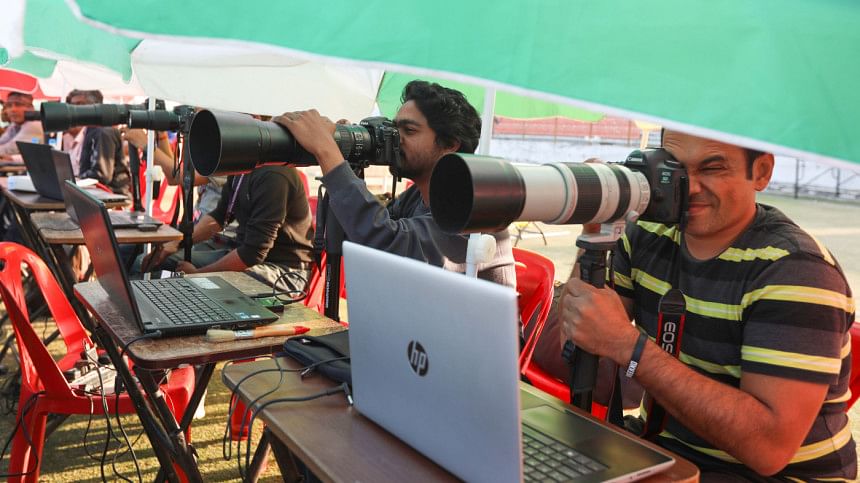The promising world of sports journalism

Sports enthusiasm has never been in short supply in Bangladesh. With the advent of the Internet, sports fans have been able to create communities that bring together individuals from all over the country, whose distinct voices and opinions attract audiences by themselves. This, in turn, has created growing opportunities for aspiring sports journalists.
The conventional definition of sports journalism confines it within reporting and covering sporting events in a rather matter-of-fact way, by providing squad news, score updates, and commentary.
However, in this day and age, sports journalism has evolved into a much more diverse form of media which now also includes blogs, analysis videos, podcasts, and other sports content that cater to fans in ways that have never been seen before.
Rifat Masud, popular sports journalist and reporter working for T Sports, recalls the contrast in sports journalism a decade ago compared to what it is now, "Ten years ago, news regarding playing style, formation, and other details of a game in the newspapers in Bangladesh was non-existent. Usually, news would be more focused on a sports personality or player. Now, there is an increasing interest among fans towards analysing the game."
On top of that, the arrival of social media has accelerated the rate at which sports news is disseminated while bridging the gap between the fans and sports journalists, making it easier for journalists to reach the audience.

We spoke to Shihab Hasan Neyon, the frontman of Neyon & on, a popular sports content creating channel on social media. According to him, "Social media has greatly reduced the barriers one would have to face in the past not only as a sports content creator, but for others as well who are pursuing different content creation."
Samama Rahman, sub-editor at The Daily Star's sports section, describes how newspapers were affected by this, "Print journalism changed drastically, with our online presence becoming increasingly important. Things usually reserved for print editions, had to be put online immediately to get more engagement. Consequently, we had to focus more on analytical stories, features or offbeat stories when it came to print."
Former professional cricketer Mazhar Uddin Omi, who now works as a commentator alongside his role as a sports journalist for The Daily Star, reflects on how he thinks social media affected news.
"In the last three-four years, social media has taken over big time. Everything that is shared is news. One has to now consider which news is authentic and newsworthy and which news is not. Overall, this has made sports journalism much more challenging," he says.
Rifat Masud also agrees that social media has made sports journalism more challenging, "Social media has compelled sports journalists to improve as news has become more accessible. It is now the responsibility of a journalist to not only break a story but also provide a detailed report that includes how and why the story broke and the impact of the story in question. Or else, a fan and a journalist sharing a news update on social media will not be any different."
"Social media changed the way news is consumed, it also showed how little substance some stories had. We had to become far more proactive in trying to break stories before other outlets than we used to be in the past and had to learn how to make multimedia content very quickly," Samama Rahman adds.
This has forced sports journalism to expand and created new opportunities for aspiring sports journalists and content creators to explore. In this day and age, everybody is a content producer as they all have the necessary social media tools and phones to create and distribute content. In order to stand out, one has to describe a topic from various angles, present all the relevant information and provide in-depth analyses, to gain the attention of curious sports fans online and to connect with them to build their own following on social media.
Someone who has been exceptionally successful at it is Saif Ahmed Chowdhury, who amassed a massive following on his Facebook page "Stories with Saif", where he writes about cricket. He currently works as a sports journalist for T Sports and Social Media Manager for Rangpur Riders and Bangla Tigers.
On building a following online, he says, "Before I started building my platform on social media, I already used to work for a couple of websites where I used to write insightful cricket articles. But on my own platform, I always tried to connect with the fans who are equally passionate about cricket or sports overall. I used to interpret the emotions of the fans through my writings. My only motive on my platform was to get connected with people who love to talk and discuss sports. Three years later, the result is now there to see."

Despite not pursuing the idea of building a platform on social media right now, Rifat Masud is very well aware of the potential in this sector as he says, "Creating a platform for a journalist has become necessary now in order to connect with people. I believe that in the future, the demand for freelance journalists will increase and journalism figures will become more influential than sports media companies and in some parts of the world, it has started already. People are now more interested in listening to what a reporter has to say when that reporter has a higher reach in social media."
Aside from reporting and writing, another facet of sports media that is particularly attractive to young people is sports commentary. But if one does not have a sporting background, Mazhar Uddin Omi believes it's tough to pursue it.
"With lack of opportunity and platform to train in this scene, it's very hard to pursue sports commentary. A sports background is vital in order to describe what's happening on the field properly and spontaneously. One needs to consider the financial aspects of it as well but recently there are new people coming in and that's a good sign. I have personally been very lucky that The Daily Star has allowed me to chase my passion and accommodated my diverse roles," he says.
For anyone who is thinking about pursuing sports journalism, they can get started with no experience, no degree in journalism, and with minimum investment. Although investing in the necessary equipment to create content such as vlogs or podcasts might give you an edge over other content creators, the most important investment you really need to make is the investment of time and effort.
Along with that, regardless of which form of sports journalism you want to pursue, it is necessary to have a great deal of knowledge on the sport you are covering.
Rifat Masud emphasised how important it is by saying, "I believe there is a fine line that creates a large separation between a fan and a journalist. Many fans are watching a game just like you, what sets you apart from other fans so that they will listen to what you have to say?"
"There is no alternative to studying the game. The ability to put in effort to study a game after watching it by reading books, consuming other sports content on the internet, listening to the analysis by pundits and former players in pre-match or post-match shows is necessary to be successful. After studying the game for years, I believe a person might finally be able to separate himself from the audience as a journalist," Rifat added.
On the other hand, Saif believes in focusing on creating a unique style in order to build a platform online.
"It makes me happy now to see that many people know me including many international cricketers through my platform and I think it only happened because I created my own style on social media when it comes to writing about cricket. So, to the people who are trying to build their own platform, my small suggestion will be to stick to their own style and creativity. Understand your audience and try to connect with your followers. After all, sports is something that unites everyone."
Neyon stresses on the need for consistency in the competitive space of social media content creation, "Even if you know it's not your best work, you have to consistently create and put out content for the audience in order to adapt with the social media algorithm. Some creators get a lot of views in one video and then struggle to get the same amount of views later on, while others don't get views even after making videos which can be very demotivating."

The sports journalism industry in Bangladesh, however, is far from reaching its potential yet and Rifat Masud believes there is still a lot of time for that to happen.
"In Bangladesh, as of now, sports journalism is not really attractive yet financially. The salary structure needs to grow so that more people are interested in pursuing this profession. At the end of the day, money matters. If this improves, sports journalism in Bangladesh will grow much more," he said.
Sports journalism in Bangladesh is on a rapid rise and people are noticing. With content being easier to put across to an audience, it's all about who can maintain better quality to get the attention of a massive fanbase.
Tamjidul Hoque loves talking about Football and watching Anime. You can contact him at [email protected]

 For all latest news, follow The Daily Star's Google News channel.
For all latest news, follow The Daily Star's Google News channel. 











Comments